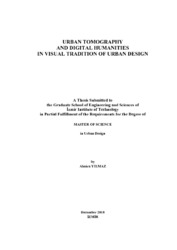Please use this identifier to cite or link to this item:
https://hdl.handle.net/11147/7155Full metadata record
| DC Field | Value | Language |
|---|---|---|
| dc.contributor.advisor | Velibeyoğlu, Koray | |
| dc.contributor.author | Yılmaz, Almira | - |
| dc.date.accessioned | 2019-07-10T12:27:20Z | |
| dc.date.available | 2019-07-10T12:27:20Z | |
| dc.date.issued | 2018-12 | en_US |
| dc.identifier.citation | Yılmaz, A. (2018). Urban tomography and digital humanities in visual tradition of urban design. Unpublished master's thesis, Izmir Institute of Technology, Izmir, Turkey | en_US |
| dc.identifier.uri | https://hdl.handle.net/11147/7155 | |
| dc.description | Thesis (Master)--Izmir Institute of Technology, City and Regional Planning, Izmir, 2018 | en_US |
| dc.description | Includes bibliographical references (leaves: 58-60) | en_US |
| dc.description | Text in English; Abstract: Turkish and English | en_US |
| dc.description.abstract | Since the 1960s, the information obtaining methods used in urban design studies in the visual-perceptual dimension have been improved and renewed with the developing technology and internet facilities in the world of the 2000s, however the urban design techniques have lagged behind this. In the studies carried out until the 1990s, only hand drawings, observations, one-to-one interviews and questionnaires were used as a data gathering method, technology and digitalism were not used. Where technology is not used in urban studies, traditional methods requires large data processing as time and effort in large-scale areas therefore data gathering methods has to change. In this study, the theoretical aspects of the methods used in the visual-perceptual tradition are discussed with the examination of especially the works of Kevin Lynch, Donald Appleyard and Gordon Cullen, who use traditional methods. Since social media and digital multimedia tools are frequently used in today's societies, every movement related to the city is available in a digital environment. It is explained that with ‘Digital Humanities’ a digital library approach that has been used in today's technology; we can have a more practical, more up-to-date and developing information network. Taking into consideration the active use of social media in today's world, considering the major trends such as big data analysis, internet of things, visualization tools -photographs, video records- and social media platforms, we can discuss the urban design of the city and its places and we will be able to obtain information about the city from millions of different perspectives. In this study, what urban designer can use the information technology and visualization methods in the accelerating new technological age and what are these methods theoretically adds to the field questions are discussed. | en_US |
| dc.description.abstract | 1960’lardan beri kentsel çalışmalarda görsel-algısal boyutta kullanılan bilgi toplama ve bilgiyi görselleştirme metotları, 2000’ler dünyasında gelişen teknoloji ve internet imkanları ile gelişmiş ve yenilenmiş ancak kentsel tasarım teknikleri bunun çok gerisinde kalmıştır. 1990'lı yıllara kadar yürütülen çalışmalarda, teknolojiden ve dijitallikten yararlanılmamış yalnızca el çizimleri, gözlem, görüşme ve anket gibi yöntemler kullanılmıştır. Bu durum günümüzde büyük ölçekli alanlarda zaman ve uğraş olarak büyük veri işleme gerektirdiğinden, veri toplama metotları değişmek zorunda kalmıştır. Bu tez çalışmasında geleneksel metotları kullanan Kevin Lynch, Donald Appleyard ve Gordon Cullen’ın çalışmaları başta olmak üzere görsel-algısal geleneğe dair kullanılan yöntemlerin teorik boyutu ele alınmıştır. 21. yüzyılda büyük caddelerde hareket eden yüzlerce insanın, gündelik hayatta kenti kullanımın şeklinin izi, dijital ortamda mevcuttur. Bu tezde, geleneksel metotların kentsel tasarım çalışmalarında eski, zahmetli ve yavaş kaldığı öne sürülmüş, günümüz teknolojisinde kullanılmaya başlanmış bir dijital kütüphanecilik yaklaşımı olan ve sosyalmekânsal bilimlere gelişen kentsel teknolojilerin imkanları ile bakabilmeyi vaat eden ‘Dijital Beşerî Bilimler’ ile daha pratik, daha güncel ve gelişen bir bilgi ağına sahip olabileceğimiz açıklanmıştır. Büyük veri analizi, nesnelerin interneti, görselleştirme araçları -fotoğraf ve video- ve sosyal medya platformları gibi büyük trendler dikkate alınarak kente ve kentin mekanlarına dair kentsel tasarıma bilgi taşınabileceği ve milyonlarca farklı perspektiften kente dair bilgi edinebileceğimiz tartışılmaktadır. Çalışmada, hızlanan yeni teknolojik çağda kentsel tasarımcının kullanabileceği bilgi teknolojileri ve görselleştirme yöntemlerinin ne olduğu ve alana teorik olarak neler katacağı tartışılmıştır. | en_US |
| dc.format.extent | ix, 60 leaves | en_US |
| dc.language.iso | en | en_US |
| dc.publisher | Izmir Institute of Technology | en_US |
| dc.rights | info:eu-repo/semantics/openAccess | en_US |
| dc.subject | Urban tomography | en_US |
| dc.subject | Urban design | en_US |
| dc.subject | Digital humanities | en_US |
| dc.title | Urban tomography and digital humanities in visual tradition of urban design | en_US |
| dc.title.alternative | Kentsel tasarımın görsel geleneğinde kentsel tomografi ve dijital beşeri bilimler | en_US |
| dc.type | Master Thesis | en_US |
| dc.institutionauthor | Yılmaz, Almira | - |
| dc.department | Thesis (Master)--İzmir Institute of Technology, City and Regional Planning | en_US |
| dc.relation.publicationcategory | Tez | en_US |
| item.languageiso639-1 | en | - |
| item.fulltext | With Fulltext | - |
| item.openairecristype | http://purl.org/coar/resource_type/c_18cf | - |
| item.openairetype | Master Thesis | - |
| item.grantfulltext | open | - |
| item.cerifentitytype | Publications | - |
| Appears in Collections: | Master Degree / Yüksek Lisans Tezleri Sürdürülebilir Yeşil Kampüs Koleksiyonu / Sustainable Green Campus Collection | |
Files in This Item:
| File | Description | Size | Format | |
|---|---|---|---|---|
| T001836.pdf | MasterThesis | 25.52 MB | Adobe PDF |  View/Open |
CORE Recommender
Page view(s)
122
checked on Jul 22, 2024
Download(s)
150
checked on Jul 22, 2024
Google ScholarTM
Check
Items in GCRIS Repository are protected by copyright, with all rights reserved, unless otherwise indicated.